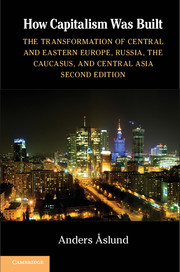 How Capitalism Was Built
How Capitalism Was Built Book contents
- Frontmatter
- Contents
- List of Tables and Figures
- Acknowledgments
- List of Abbreviations
- Introduction
- 1 Communism and Its Demise
- 2 Radical Reform versus Gradualism
- 3 Output
- 4 Liberalization
- 5 From Hyperinflation to Financial Stability
- 6 Privatization
- 7 The Social System
- 8 The Politics of Transition
- 9 From Crime Toward Law
- 10 The Importance of the European Union
- 11 The Global Financial Crisis, 2007–2012
- 12 Conclusions
- Bibliography
- Index
8 - The Politics of Transition
Published online by Cambridge University Press: 05 December 2012
- Frontmatter
- Contents
- List of Tables and Figures
- Acknowledgments
- List of Abbreviations
- Introduction
- 1 Communism and Its Demise
- 2 Radical Reform versus Gradualism
- 3 Output
- 4 Liberalization
- 5 From Hyperinflation to Financial Stability
- 6 Privatization
- 7 The Social System
- 8 The Politics of Transition
- 9 From Crime Toward Law
- 10 The Importance of the European Union
- 11 The Global Financial Crisis, 2007–2012
- 12 Conclusions
- Bibliography
- Index
Summary
Politics were crucial for the success of market economic transition. The collapse of communism was both a political and an economic process. This book focuses on economics, so we shall deal only with politics as it influenced economic policy rather than as an aim in itself.
An important reason for the breakdown of the communist dictatorship was a split in the old elite, the Nomenklatura. Some in the old establishment thought they would be better off economically and freer under a more liberal regime. Many “members of the old elite were now discovering that they could maintain their privileged positions in society even without the ideology.... the party was no longer a monolith. And once it ceased to be a monolith, it was no longer viable” (Dobbs 1997, pp. 373–4). The reformers within the Communist Party were opposed by dogmatic hardliners who wanted to maintain the old order, and the escalating struggle between these two factions made it possible for outside reformers, often true democrats, to start playing a political role (McFaul 2001).
When communist power collapsed, the political situation changed in a revolutionary fashion. Usually, two dominant forces emerged, a broad popular movement embracing democracy and freedom, opposed by the reformist part of the old elite, whereas the hardliners simply disappeared. A dilemma for rising democrats was whether to opt for a full defeat of the old system or to compromise with its more progressive members.
- Type
- Chapter
- Information
- How Capitalism Was BuiltThe Transformation of Central and Eastern Europe, Russia, the Caucasus, and Central Asia, pp. 239 - 282Publisher: Cambridge University PressPrint publication year: 2012
